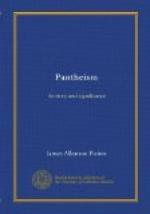“If any one will speak plainly,” he writes,[12] “he might say that the intelligible world is nothing other than the word (se. [Greek: logos], reason) of the world-making God. For neither is the intelligible city anything other than the thought [Greek: logismos] of the architect already intending to build the city. This is the teaching of Moses, not mine. At any rate in what follows, when he records the origin of man, he declares outright that man was made in the image of God. But if a part (of creation) reflects the type, so also must the entire manifestation, this intelligible ordered world, which is a reproduction of the divine image on a larger scale than that of man."[13]
[Sidenote: Motives Underlying his Distortion of Hebraism.]
[Sidenote: Not Pantheistic.]
How Philo managed to extort this out of the Pentateuch is a question of interest, but one on which I cannot delay. Suffice it, that while he thus showed his reverence for the traditions of his race, his whole aim is to fire philosophy with religious devotion. But he was not, in any strict sense of the word, a Pantheist, though he regarded the Logos as an emanation from the Eternal, and the kosmos, the ordered world, as in some way emanating from the Logos. Perhaps, indeed, if we could exclude from emanation the idea of time, as Christians are supposed to do when they speak of the “eternal generation” of the Divine Son or the “procession” of the Holy Ghost, we might regard Philo, with the succeeding Neo-Platonists and some of the Gnostics, as approximately Pantheistic. But his vagueness and uncertainty about matter forbid such a conclusion. For whether he regarded matter as eternally existing apart from the divine substance, or whether he looked upon it as the opposite of Being, as a sort of positive nothing, in either case, it cannot be said that for him the whole Universe was God, and nothing but God.
[Sidenote: Neo-Platonism.]
[Sidenote: Resultant of Contact between East and West.]
If I have given more space to the great Alexandrian Jew than my narrow limits ought to afford, it is because I think I may thus avoid the necessity of saying much about the philosophic schemes of the Neo-Platonists, the phantasies of the Gnostics, or the occasionally daring speculations of the Christian Fathers. For whether the works of Philo were much studied by the Greeks or not, they certainly described the spiritual resultant—so to speak—emerging from the mutual impact of Western and Oriental, especially Jewish, ideas. Which resultant was “in the air” from the first century of the Christian age; and the later epistles ascribed to St. Paul, as well as the Fourth Gospel, show clear traces of it.[14]
[Sidenote: Its Religious Inspiration.]
[Sidenote: Suggestive of Pantheism, but not such in Spinoza’s Sense.]




